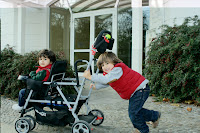In This Great Future
GRASS
Carl Sandburg
ILE the bodies high at Austerlitz and Waterloo,
- Shovel them under and let me work--
- I am the grass; I cover all.
- And pile them high at Gettysburg
- And pile them high at Ypres and Verdun.
- Shovel them under and let me work.
- Two years, ten years, and passengers ask the conductor:
- What place is this?
- Where are we now?
- I am the grass.
- Let me work.
It's a lovely view. The small mountain is covered in lush green trees, stone walking paths, benches for a rest. It's the view I see every time I look out of our apartment window, and I enjoy it. I love hearing the birds in the morning and seeing the first rays of the sun hit the trees, illuminating their new Spring hues. What I've recently discovered, however, is that this beautiful view used to be something entirely different, both in appearance and in meaning. While browsing the Internet, I came across some information about the Volkspark Friedrichshian, which is the park we overlook. I happened to see this picture of a view that looks startlingly familiar:
This is Große Bunkerberg, the larger of the two Friedrichshain bunkers used by the Nazis in World War II. This image is the bunker in 1949.
Here's my view today; it's where the Kleine Bunkerberg, or the smaller bunker stood, but looks nearly identical to the above, which is on the other side of the park. The only difference is the height of the hill.
Here's the view in both Summer and Winter.
So what I'm looking at is a man-made mountain with the rubble of a Nazi bunker buried beneath. According to Wikipedia, in 1946, the GDR director of landscape and park architecture, Reinhold Linger, decided to take the mounds of rubble created by Allied bombing in WWII and make these two man-made "mountains" of out them, so that in time, they would blend with the natural landscape. And I guess it worked! I never would have known what was under the "mountain" if I hadn't come across it on the Internet. A bunker used by the Nazi regime--the regime my grandfather fought in Germany to defeat-- is buried beneath the soil my children play upon today. That, to me, is mind blowing.
And that's certainly not the only piece of history Germans have decided to bury. Hitler's bunker was unmarked until 2006, and then there was a plaque placed in its location.
 |
| Site of Hitler's Bunker 2005 |
 |
| Sign marking Hitler's Bunker today |
In most parts of the city, where the Berlin wall once stood there are simply two lines of brick running along the former path of it.
 |
| Berlin Wall 1986 |
 |
| Berlin Wall plaque marking the wall's former location |
Potsdamer Platz, the border crossing area between East and West Berlin and a no man's land filled with barbed wire and mines is now a sprawling, glittering city center with the Sony Center, the Ritz Carlton, and a mall.
 |
| Potsdamer Platz 1963 |
 |
| Potsdamer Platz 2007 |
Also, Mein Kampf, Hitler's autobiography/ideology is still illegal to copy or publish in Germany. Now I realize that some of these things, namely the Nazi past, are downplayed for obvious reasons so that they don't become shrines to modern day sympathizers, but I was still surprised at how certain parts of history seem to be swept under the rug of collective national guilt. I remember a conversation with the director of Bucker's kita in which he asked if I wanted to sign the waver for the pediatrician to do routine examinations on my child when the doctor visited the kita. As an American, I thought nothing odd about this, and I was actually excited that it might save us a few trips to the doctor for well-checks. When he saw that I was about to sign to consent, he stopped me, and said that most parents don't agree with this because "we still have problems thinking about people standing in lines to be 'examined' by doctors." I realized then what a burden this country still carries from the past.
So I've pondered this discovery during the last few weeks, and I remembered the Sandburg poem I used to teach to my students about the question of history, and how we remember it. To me, he is speaking to nature's ability to heal the wounds of the past, but at the same time having the ability to erase the memory of it. Is it our duty to remember and memorialize the past and its atrocities, or is it better to let nature take its course and allow people to move on and possibly forget? I believe there's great danger in forgetting. Of course, we all know Santayana's warning: "Those who cannot remember the past are condemned to repeat it." Should we memorialize or let the open wound of a battlefield or the crater in the earth from the fallen towers speak for itself?
I'm not sure if it's even a question of remembering and/or memorializing, but rather perhaps we must educate ourselves and learn from the past. I am trying my best to learn more about the past of this place, and perhaps I'll make some new discoveries that I'll share with you along the way. Until then, I'll echo the words of Bob Marley, "In this great future, you can't forget your past."
How do you think we should handle the past? Have you ever made any surprising discoveries or learned something you didn't suspect about the history of a place?







